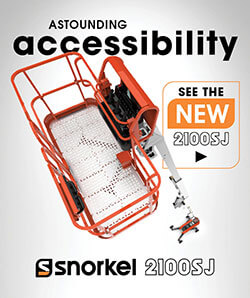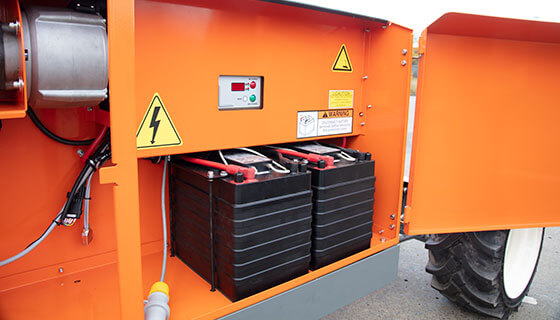Snorkel conducted a market study on the demand for diesel and electric aerial lifts. Findings show that increasing regulations on emissions and noise have resulted in a steady decline in demand for diesel powered equipment on many jobsites across the world.
Electric lifts can be powered by lead acid or lithium-ion batteries. While both battery types offer a clean alternative to diesel, lithium-ion batteries provide a number of benefits in efficiency, maintenance requirements and longevity.
To meet and fulfill market demand for direct alternatives to diesel aerial lifts, Snorkel has developed a number of lithium-ion battery-powered models that deliver quiet operation with zero emissions, which includes its compact rough terrain scissor lift family, two Speed Level lifts, and a compact rough telehandler.
How do lithium-ion batteries work?
Lithium-ion batteries are a type of rechargeable battery that uses the movement of lithium ions to create the flow of electricity. On Snorkel lifts, lithium-ion batteries replace diesel to power an electric motor in place of a combustion engine.
The overall operation of the lithium-ion battery-powered machine remains largely the same as a diesel machine, but with zero emissions. Higher torque delivers higher gradeability from lithium-ion battery-powered machines for improved performance on rough or uneven terrain.
Another major advantage of a lithium-ion battery-powered Snorkel lift is quiet and maintenance-free operation with significantly longer life cycles than lead acid batteries. Low noise and zero emissions help to meet jobsite regulations while reduced maintenance delivers a low total cost of ownership.
What’s the difference between lead acid and lithium-ion batteries?
Traditional lead acid batteries typically cost less than lithium-ion batteries. However, lithium-ion batteries offer higher energy density, are more efficient and last longer than lead acid batteries.
Energy density is the amount of energy that can be stored in a physical space. With a high energy density, lithium-ion batteries are able to discharge more stored energy than lead acid batteries, making them more efficient.
When measured in discharge cycles, lithium-ion batteries also last longer than lead acid batteries. Lithium-ion batteries have a better depth of discharge and can be used at a higher capacity before recharging. On the other hand, discharging lead acid batteries at more than 50% of its capacity can negatively impact the lifetime of the battery.
Since lithium-ion batteries have a higher efficiency, they can handle a higher amp to charge faster than lead acid batteries. The closer to full capacity, the slower lead acid batteries need to be charged to avoid overheating. Additionally, not fully recharging lead acid batteries could reduce its overall lifespan.
How do you maintain lithium-ion battery-powered Snorkel lifts?
Aerial lifts with diesel engines require regular servicing and maintenance such as frequent oil changes, filter changes and occasional repairs to maintain top performance and longevity. Any servicing results in downtime, lost productivity, and could pose a risk to the machine operation, even scheduled maintenance.
Lead acid batteries also require regular maintenance for proper performance, which could lead to additional costs of operation, while lithium-ion batteries are maintenance-free.
Both the battery pack and electric motor on lithium-ion battery-powered Snorkel lifts are maintenance-free. This saves significant time on the job as well as delivers a low total cost of ownership.
What should you expect from lithium-ion battery-powered Snorkel lifts?
Lithium-ion battery-powered Snorkel lifts offer high efficiency, high performance and smooth operation.
A lithium electric rough terrain Snorkel scissor lift can last longer than a lead acid battery model before needing to be recharged. Depending on speed and amount of usage, an electric model could stay charged and be operated for up to one work week between charges. Lithium-ion batteries can be fully charged in 5 to 8 hours to maximize productivity and be top-up charged as needed.
Higher torque, higher speeds and higher gradeability deliver powerful rough terrain capabilities that reach new levels in battery-powered Snorkel lifts. Dependent on the model, a lithium electric Snorkel lift can climb gradients up to 50% for work at height on sloped ground.
Lithium electric Snorkel lifts and telehandlers are equipped with a proportional joystick that has been optimized to provide improved operator control and efficiency over diesel models. Using the digital output to control the motor directly results in tactile and responsive acceleration to deliver noticeably smoother performance on the job.
Snorkel Lithium Electric Models
Snorkel aerial lifts powered by lithium-ion batteries boast more increased duty cycles, less maintenance and quicker charging, when compared to electric aerial lifts powered by lead acid batteries. In addition, they deliver equal or greater rough terrain performance than their diesel-powered equivalents.
Lithium-ion batteries are better suited to aerial lift applications that involve long range driving, than lead acid batteries. For projects such as tunnel maintenance, Snorkel offers the option to expand the number of lithium-ion batteries to increase operating times and overall battery life.
Snorkel Compact Rough Terrain Electric Scissor Lifts
The Snorkel S2770RTE, S3370RTE and S3970RTE are equipped with long-lasting lithium-ion batteries for clean and quiet operation. Combined with powerful 4-wheel drive, these compact models easily tackle tough terrain.
Snorkel SL26RTE & SL30RTE Electric Speed Levels
The Snorkel SL26RTE and SL30RTE electric Speed Levels are 100 percent battery-powered for highly efficient and lasting performance, emitting up to 60% less noise than the diesel equivalent.
These lithium-ion batteries can be fully charged in less than 6 hours and can perform on a typical 8-hour shift without needing to recharge on a standard two-battery system, depending on the application. The RTE series can be expanded up to a maximum of four lithium-ion batteries for up to 120% battery life.
Snorkel Rough Terrain Telehandlers
The Snorkel SR5719E/SR626E is an industry first – designed as the electric version of the SR5719/SR626 compact rough terrain telehandler. Its full-time 4-wheel drive is powered by lithium-ion batteries for long-lasting durable performance. Reduced noise and zero emissions are suitable for indoor use.
For more information on your Snorkel lift, visit Snorkel Support.



